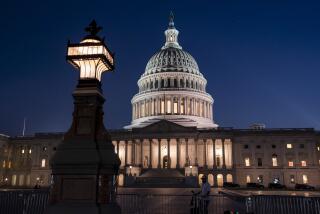Senate Kills Higher Tax on Cigarettes of $1.50 a Pack
- Share via
WASHINGTON — Public health groups on Wednesday lost a bid to raise the price tag on sweeping tobacco control legislation when the Senate killed a proposal to raise cigarette taxes by $1.50 per pack--40 cents above the amount sought by the bill’s sponsor.
In the 58-40 vote, 45 Republicans joined 13 Democrats in defeating the amendment by Sen. Edward M. Kennedy (D-Mass.) to raise the cigarette tax by the higher amount as a way to discourage teen smoking, reimburse health care costs and fund anti-smoking programs.
The vote appeared to set the upper limit of any tobacco tax likely to pass Congress this year at $1.10 per pack, as originally proposed in the bill sponsored by Sen. John McCain (R-Ariz.) and supported by the White House. California’s Democratic senators split on the $1.50 proposal--Barbara Boxer supported it while Dianne Feinstein voted against it.
In another important vote that signaled broad support for the legislation, senators soundly defeated, 72 to 26, a proposal by Sen. John Ashcroft (R-Mo.) to strip the measure of any tax increase. Under the McCain bill, part of the new taxes would provide federal public health and medical research programs with nearly $30 billion over the next five years. Even more money would go to the states, in part to pay for anti-smoking programs.
Both Boxer and Feinstein opposed the proposal by Ashcroft, a conservative who wants to kill the bill. Only Republicans--less than half of the Senate GOP membership--backed his amendment, indicating that there is enough bipartisan backing to pass a major tobacco bill this year.
However, lobbyists and lawmakers said that showdowns expected today and Friday in the Senate over aid to tobacco farmers and legal protections for the tobacco industry could still derail the legislation.
President Clinton weighed in in opposition to an amendment to wipe out the bill’s major legal protection for tobacco companies--an $8-billion cap on the amount of damages that cigarette manufacturers would have to pay in any one year. Given that the bill is considerably tougher than a proposed settlement negotiated by the industry last year, supporters--including Clinton--said that without getting some benefit, tobacco companies can be expected to file legal challenges and delay implementation for years.
In a letter to Senate Majority Leader Trent Lott (R-Miss.), Clinton said that he opposed the amendment to eliminate the cap, offered by Sens. Judd Gregg (R-N.H.) and Patrick J. Leahy, (D-Vt.). “If a cap that doesn’t prevent anybody from suing the companies and getting whatever damages a jury awards will get tobacco companies to stop marketing cigarettes to kids, it is well worth it for the American people,” said Clinton.
The Kennedy amendment to hike cigarette taxes by $1.50 a pack was backed by many health experts and anti-smoking groups, who argued that such a sharp increase is the best way to discourage smoking, particularly among price-sensitive teens.
But opponents condemned the increase as a highly regressive tax on blue-collar workers and the poor, who dominate the ranks of smokers.
Cigarettes now cost about $2 a pack, so the proposed $1.10 increase would raise the price at least 50%--although at that level U.S. cigarette taxes would still be lower than in other industrial countries.
McCain’s Commerce Committee originally had passed a bill containing the $1.10 price increase. But the Finance Committee, which also had jurisdiction over the legislation, changed the bill to include a $1.50 tax increase. The Senate leadership dropped the tax increase Monday, reverting to the McCain plan when the chamber began debating the bill.
Support for the Kennedy amendment among Democrats was less than unanimous, in part because the White House had agreed to support the $1.10 level and lobbied against any increase.
More to Read
Get the L.A. Times Politics newsletter
Deeply reported insights into legislation, politics and policy from Sacramento, Washington and beyond. In your inbox twice per week.
You may occasionally receive promotional content from the Los Angeles Times.









